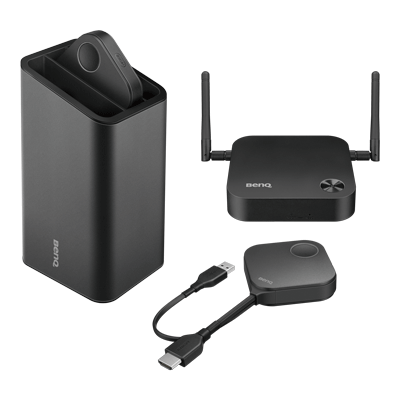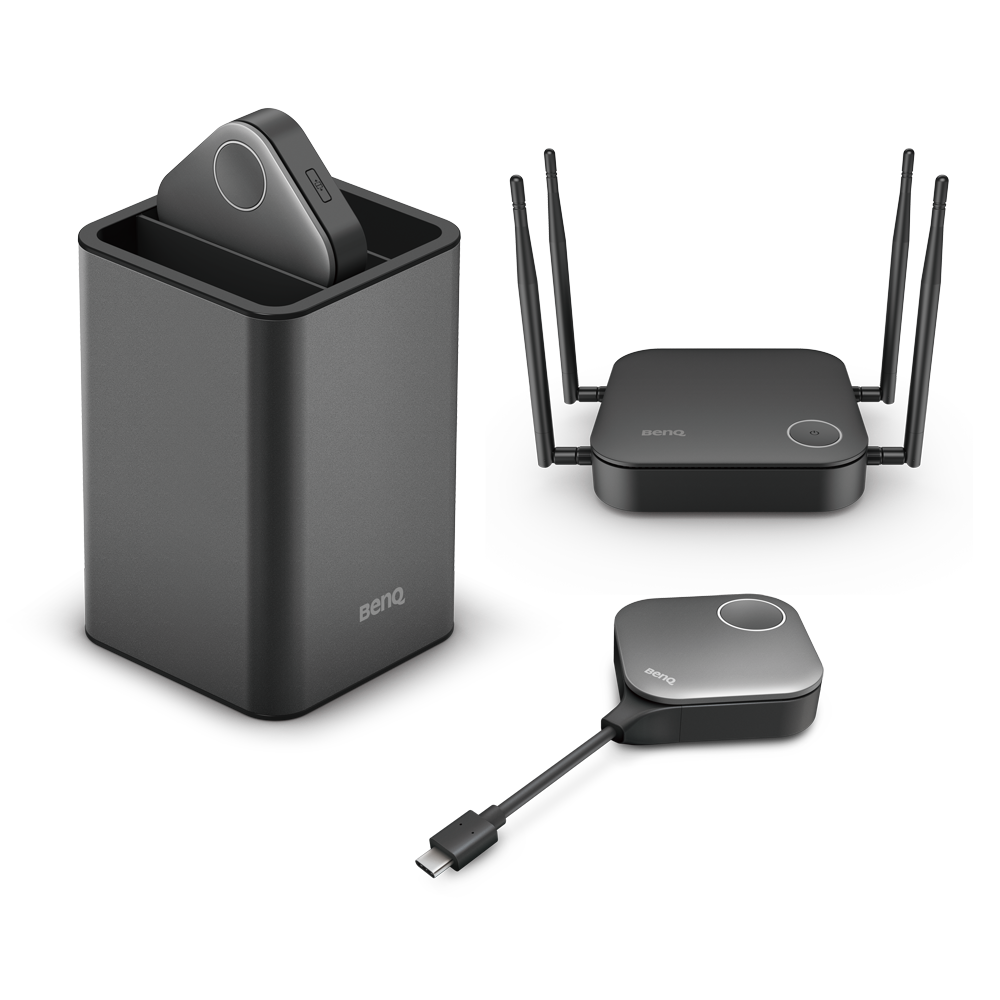Best Miracast Alternative for Wireless Screen Mirroring?
- BenQ
- 2022-04-20
What is Miracast?
Miracast is a wireless communication standard that enables Andriod and Windows users to wirelessly connect to a properly equipped display. Introduced by the WiFi Alliance in 2012, Miracast has been growing in popularity, and many IT managers are familiar with the technology as they look to transition away from traditional cables. This article will look at the tradeoffs between different Miracast products for use as a wireless HDMI system for a corporate meeting room.
What are Miracast Alternatives?
Option #1 – Use a free (or inexpensive) Miracast app on your device
If you have a smart TV and a Windows or Android device, you can either cast directly from your device or download a number of inexpensive or free apps onto your device. There are a number of solutions on sites like Amazon, and while they can all do screen mirroring it can be a challenge to implement effectively for use in a meeting room. For example, apps may have restrictions on third-party software on your device, such as VMWare, that would need to be uninstalled for the app to work. This is often why many products have poor Amazon ratings. Also, many of these apps may lack security featues such as encryption or may not work on all types of devices. Many of these also require the display ( projector / tv / touch screen ) to be able to receive a Miracast signal. You may also want to check the reviews associated with the app or product to see how easy ( or not ) others found it to set up and use.

Option #2 – Use a wireless HDMI screen mirroring system based entirely on Miracast
Since many companies use displays without integrated smart TV software in meeting rooms, one inexpensive alternative is the use of Miracast with a Microsoft Wireless Display Adapter. While these are inexpensive Miracast alternative solutions, they may not be what you need for collaborative meeting rooms where the BYOD approach is common. Another popular solution is the BenQ QCast Video Streaming Dongle , which is designed to run on many popular projectors and can wirelessly stream your videos, movies, documents, websites, and live video sessions to any display with 1080p image quality and 30FPS video. While the QCast supports all major types of computers and mobile devices via an app, there is no compatibility with Mac OS X or iOS devices through the Microsoft Wireless Display Adapter, and only limited support for some Android devices. One additional consideration is that it is difficult to ensure that wireless content is not being seen or recorded by an unauthorized employee or hacker, since these wireless transmissions may be received outside the conference room or huddle space.
Option #3 – Wireless HDMI Screen Mirroring systems designed for meeting rooms
While Miracast can be a great technology to wirelessly mirror your computer screen to a meeting room display, wireless HDMI presentation systems that are actually designed for meetings are the most popular ones for use with BYOD based on data from Futuresource. These systems are more expensive than free apps or inexpensive dongles, but deliver a number of unique benefits that are needed in a typical meeting room or huddle space. These include :
- Instant switching between multiple presenters
- Support for major desktop, notebook, and tablet operating systems
- Support for media players, cameras, and other non-PC devices that output HDMI
- Content and network security protection
- Split-screen display for multiple presenters
The most popular systems include the Barco ClickShare and BenQ InstaShow.
Meet InstaShow
The BenQ InstaShow is an example of a wireless HDMI system designed for meeting room collaboration. You plug in a “button”, which is a wireless HDMI transmitter, to your notebook or mobile device, and with one tap start presenting to the screen. The system uses an intuitive design and doesn’t require any apps or special software to be loaded onto a presenter’s device . It comes with two buttons and a tabletop holder to keep everything neat. BenQ InstaShow has AES 128-bit encryption and WPA authentication, which keep your network and presentations secure from wireless snooping and recording, and level up your meeting experience and data security.
Miracast Alternatives Comparison
Here is a fair comparison of how different Miracast alternatives break down by feature and price. While there are over 40 different wireless presentation systems available today, these are solid meeting room screen mirroring solutions from the popular worldwide brands according to Futuresource.
| Technology | Free Miracast app | Wireless Display Adapter | Wireless HDMI screen mirroring systems designed for meeting rooms |
Technology Product | Free Miracast app Airscreen AllCast for Fire TV | Wireless Display Adapter Microsoft Wireless Display Adapter BenQ QCast | Wireless HDMI screen mirroring systems designed for meeting rooms BenQ InstaShow |
Technology Highlight | Free Miracast app Cost-effective Potential virus or hack issues | Wireless Display Adapter Not-compatible with IOS or MAC system Potential security leak issues | Wireless HDMI screen mirroring systems designed for meeting rooms One-click sync High-security protection ( WPA2 / WPA3 , AES-128, CC EAL6+ ) Laptop/desktop/tablet/mobile support ( Mobile supports on WDC-20 / WDC-30 ) |
Technology Requirements | Free Miracast app Must be a smart TV or Wi-Fi-equipped display, and the device need to have a Miracast signal | Wireless Display Adapter HDMI and USB ports on the display, which can receive Miracast signal | Wireless HDMI screen mirroring systems designed for meeting rooms HDMI |
Technology Maximum Resolution | Free Miracast app N/A | Wireless Display Adapter 1080p 30fps | Wireless HDMI screen mirroring systems designed for meeting rooms WDC-10 - 1080p 60fps WDC-20 - 4K 30fps WDC-30 - 4K 60fps |
Technology Max number of presenters | Free Miracast app 1 | Wireless Display Adapter 1 | Wireless HDMI screen mirroring systems designed for meeting rooms 16-64 |
Technology Split Screen | Free Miracast app No | Wireless Display Adapter No | Wireless HDMI screen mirroring systems designed for meeting rooms Yes, up to 4 Split Screen |

